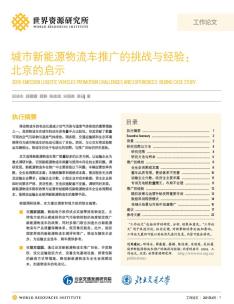Zero-Emission Logistic Vehicles Promotion Challenges and Experiences: Beijing Case Study
Transitioning to zero-emission logistic vehicles is a key measure for cities to achieve cleaner air and to prevent climate change. However, the number of urban electric logistic vehicles is far behind the targets set by the central governments. The study uses Beijing—a city that leads China’s urban logistic vehicle electrification--as an example, and surveyed logistic service providers, in order to identify challenges exist for the purchase, operation, and maintenance of electric logistic vehicles and provide recommendations for promoting zero-emission logistic vehicles.

Although urban logistic vehicles constitute less than 10% of vehicles on the road in most cities, they account for a disproportionate amount of transport-related CO2 emissions and pollutants. Hence, transitioning to zero-emission logistic vehicles is a key measure for cities to achieve cleaner air and to prevent climate change. Although China’s central governments including State Council, the Ministry of Transport and the Ministry of Ecological Environment have prioritized urban logistic vehicles (GVWR <4.5t) for electrification and set promotion targets, the number of urban electric logistic vehicles is far behind the targets.
The study uses Beijing—a city that leads China’s urban logistic vehicle electrification--as an example, and surveyed logistic service providers of different sizes, operation characteristics (own-account and for-hire), and duty cycles (one shift per day, two shifts per days, or three shifts per day, and milk runs) to identify the barriers to the adoption of electric logistic vehicles.
The survey results reveal numerous challenges exist for the purchase, operation, and maintenance of electric logistic vehicles, including 1) limited operation efficiency and low vehicle residual values leading to a high total cost of ownership (TCO) for the first owners, compared to that of fossil fueled vehicles; 2) poor vehicle quality and after-sales services resulting in high maintenance costs; 3) fragmented urban delivery market characterized by small, own-account logistic service providers sensitive to high TCOs; 4) strict delivery time-window requirements from shippers; and 5) lack of sensible charging infrastructure planning to meet vehicles’ operational duty-cycle needs.
The study also indicates: first, most of the duty cycles of urban deliveries are ready for electrification, although three shifts per day and milk runs with goods of volumetric weights may still face electrification challenges; second, most vehicles are well posed for electrification, except for refrigerated vehicles; third, road access privileges and operation subsidies for electric logistic vehicles can reduce the lifecycle costs and are therefore important to encourage vehicle electrification.
To further accelerate logistic vehicle electrification, the research recommends that the central and local governments to take joint actions:
- On the national level, the relevant ministries should provide guidance and supervision on logistic vehicles’ quality assurance and after-sale services, form proven electric vehicles’ residual value assessment system (to facilitate the creation of second owners or third owners’ market for electric logistic vehicles), and establish a national testing, scoring, and noticing system for the technical performance of different electric logistic vehicle brands.
- On the local level, besides public subsidies, municipal governments should set concrete promotion targets of electric logistic vehicles for the 14th Five Year period, grant road access privileges to electric logistic vehicles (and even consider the introduction of zero-emission freight zones), consolidate deliveries and improve operation efficiency, improve the provision of charging infrastructure dedicated to electric logistic vehicles, organize public education campaigns for shippers and logistic service providers, and explore innovative financing schemes like financial leasing.
Projects

Sustainable Mobility
Visit ProjectSustainable Mobility Project aims to contribute to the development of low-carbon transportation in China, and build a green, efficient, inclusive and resilient urban mobility system.
Part of Sustainable Cities
Low-carbon transport
Visit ProjectWe work with national and local partners to develop medium- and long-term transport decarbonization roadmaps, formulate near-term key emission-reduction solutions, and facilitate global knowledge sharing, to achieve the low-carbon transition of China’s transport sector while ensuring social equit
Part of Sustainable Cities
